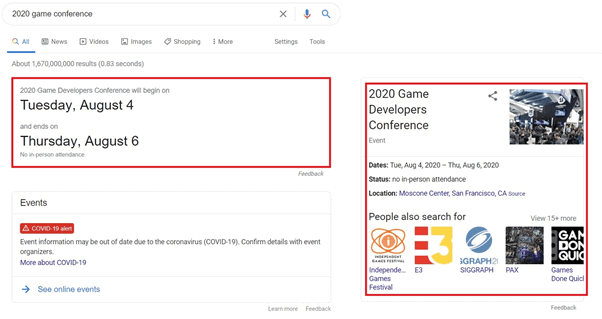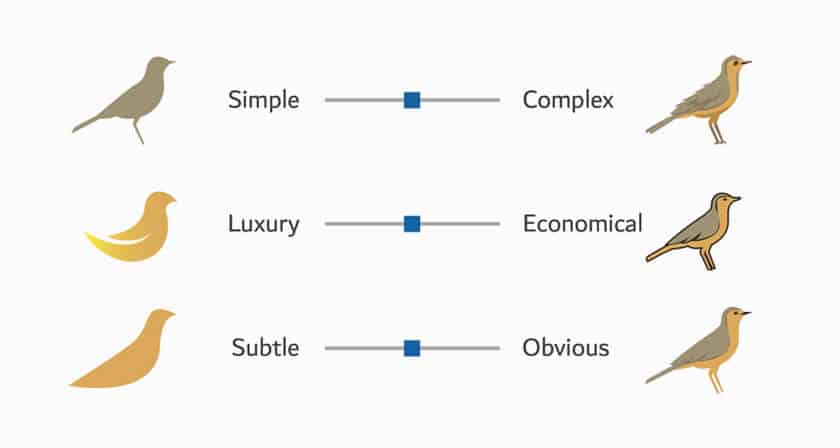. Tha30-second summary:
- From Google’s Cloud Next conference to Starbucks’ shareholder’s meetings, the live event industry has undergone a dramatic transformation in light of the global COVID-19 outbreak.
- As online services become more integrated into people’s lives, audiences expect more information that’s up-to-date and delivered quickly, including the events they plan on attending.
- This is where event schema markup can really help optimize event web pages so they show up on search results pages.
- Superb Digital’s Managing Director, Paul Morris shares a comprehensive guide on how to implement event schema markups that can win SERP rich results.
The live event industry has undergone a dramatic transformation in light of the global COVID-19 outbreak.
From Google’s Cloud Next conference to Starbucks’ shareholder’s meetings to live music performances, organizations and performers have had to move their in-person events online to curb the spread of the novel coronavirus while still addressing their audiences’ needs.
As online services become more integrated into people’s lives, audiences expect more information that’s up-to-date and delivered quickly, including the events they plan on attending. This is where event schema markup can really help.
What is an event schema markup?
Schema markup is code that helps search engines better understand what a web page is about in order to present more informative search results for users.
Instead of just basic HTML that points out what is the text or an image on a web page, schema markup provides context to information so that search engines know what content on a web page means.
Event schema markup is code that specifically points out to search engine facts relating to events, such as the location, schedule, organizer, and performers.
Schema markup is actually one of the multiple vocabularies that define terms and values in order to implement structured data (it just happens to be the most popular). In fact, Google, Yahoo, Bing, and Yandex have all collaborated to come up with Schema.org—an open community resource that provides schemas for their respective search engines to recognize.
What are the SEO benefits of using event schema markup?
Event schema markup can help your website’s search results ranking in a number of ways:
1. Rich results
Event schema markup provides specific facts that are immediately apparent on SERPs as rich results. Rich results are the details that appear in addition to the default blue links and text descriptions. They show important facts to users about a particular webpage and can include a multitude of things from reviews to recipes.
This has a two-pronged benefit. Rich results make for a better search experience for the users, first and foremost. Organizations, meanwhile, will stand out more in SERPs thanks to the eye-catching facts and visuals. On top of this, rich results also mean your webpage is occupying more screen real estate in the SERPs, pushing competitors further down the page.
2. Click-through rate (CTR) increase
One major effect of having rich results displayed for your webpages is that users are more likely to check out your site, instead of other sites that don’t show as much info. Your link will grab more attention.
Even if there will be users who are satisfied with just getting the bare minimum from the rich results, there is still a percentage that will click on your link to get more in-depth info or sign up as an attendee and book a spot.
3. Traffic boost
In line with getting higher CTR, your webpages that have event schema markup implemented can also enjoy higher traffic. Events platform Eventbrite is one of the strongest cases for event schema markup boosting traffic. They saw a 100% increase in the year-over-year growth of traffic from Google to their event listing pages.
Allen Jilo, an Eventbrite product manager, said that they saw a “visual difference in event search results on Google” within two to three weeks of event schema markup implementation.
4. Voice search optimization
Google Product Manager Aylin Altiok and Senior Engineering Manager for Google Search Will Lescszuk delivered a talk in Google I/0 2019 about the importance of structured data in improving the user search experience. In that talk, they mentioned that their motivation for schema markup was to be able to optimize content for both voice and search.
When you use event schema markup, you do not have to create two separate experiences to optimize for text and voice search. Apply it once and you can reach a bigger audience.
Google reported that voice made up 20% of searches in their app, and that was back in 2016. With digital voice assistants in use expected to reach eight billion by 2023, now is as good a time as any to start optimizing your event pages with schema markup.
What types of events can you markup?
Event schema markup can be used for a wide range of events, but there are still limitations that you need to respect if you don’t want to be penalized.
The event types that you can markup include:
- Business events
- Children events
- Comedy events
- Courses
- Dance events
- Deliveries
- Education events
- Exhibitions
- Festivals
- Food events
- Hackathons
- Literary events
- Music events
- Publication events
- Sale events
- Screenings
- Social events
- Sports events
- Theater events
- Visual arts events
You can also mark up a series of multiple events that have a connecting theme.
Do not markup business hours and promotions such as vacation packages, limited-time discounts, and coupons as events. Doing so runs the risk of your entire website being disqualified from showing rich results for any of your content.
How do I get my events to show up on Google?
First of all, you need to make sure your event pages can be crawled by Googlebot. If you use robots.txt or robots meta tags, they should allow Googlebot to index your event pages.
You should then implement schema markup in your event pages. Google only supports rich results for pages that feature a single event, so you should have individual pages for each of your events.
Required schema markup properties
There are three properties that an event page’s code needs for the page to show rich results on Google.
- location
- Name – Name of the venue
- Address – Detailed address
- name — Use the full title. Don’t include prices or promotions.
- startDate — The start date and time (if available) in the local timezone. If you don’t have an exact time, don’t specify it.
The following properties are not required, but they allow for more customization of rich results and a better overall user experience:
- description
- endDate
- eventAttendanceMode (critical for online-only events)
- image
- offers.availability
- offers.price
- organizer
- performer
Adding event schema markup
There are generally three ways to add event schema markup:
- Posting on third-party sites — The easiest way is to just post your events on big third-party events or ticketing sites like Eventbrite or Ticketmaster. These platforms are already integrated with Google, so they always show rich results for events related to particular search terms. Of course, these sites won’t be sending traffic to your website.
- Use platforms with built-in tools for schema markups — Ecommerce platforms like Magento and OpenCart already have structured data integrated. If you’re using a CMS such as WordPress, there are plenty of free plug-ins you can choose from to implement event schema markup easily.
- Coding — The third and hardest way is when you have a custom website that you can’t just use a plug-in with. This requires some coding but thankfully, you don’t have to be an expert web developer if you want to do it yourself.
How to add event schema markup yourself
The simplest method to add this code to your site is to use Google’s Structured Data Markup Helper.
In the Enter Page section, select “Events” and type or paste the URL of the events page you want to markup on the bottom bar and click on Start Tagging.
In the Tag Data section, highlight the information you want tagged and choose the appropriate tag from the dropdown menu.
If there is info that isn’t present in the page that you believe should be tagged, click on the “Add missing tags” button on the bottom right. Supply the missing information in the following window.
When you’re done adding all the important tags, click on the red “Create HTML” button on the top right. You should be taken to the View HTML section where you’ll see generated HTML code that has all the info you tagged.
Click Download to download the HTML code, which you can then copy and paste below the <head> section of your event page’s HTML.
If you are hosting an online-only event, you will have to manually add a couple of lines of code since the Structured Data Markup Helper doesn’t have the option to indicate if the event is strictly virtual.
The code is as follows, with the sample URL in “url” replaced with the actual URL you’ll be using for your online event.
“eventAttendanceMode”: “https://schema.org/OnlineEventAttendanceMode”,
“location”: {
“@type”: “VirtualLocation”,
“url”: “https://sample.streamurl.com/”
},
How to test your event schema markup
Before you make wholesale changes to your site’s source code, you want to test the generated HTML to see if Google finds the corresponding page eligible for rich results. Fortunately, Google has just the tool for that—the aptly named Rich Results Test.
Click on the CODE tab, paste the HTML code generated by Structured Data Markup Helper onto the box, and click on the “Test Code” button.
If there are no errors in the code, the test results should show that the page is eligible for rich results.
Note that the tool will show warnings despite its eligibility, if you don’t include all of the recommended tags for events, such as the name of the performer, the end date, and offers. If you have that information available, it’s highly recommended that you tag them in Structured Data Markup Helper.
Employ event schema markup for easy SEO wins
We may now be in a world where in-person events are a rarity, but that hasn’t curbed our desire for gatherings as we’re naturally social creatures. People will continue to want to take part in mass activities, whether that’s offline or online. Utilising event schema markup, your business can make the pivot towards more online events, whilst standing above the competition in the SERPs through rich results.
After reading this guide, you should find that it’s not actually too hard to make a start. “Start” is the keyword here, however, as more familiarity with coding can lead you to even deeper customization of your event pages’ HTML for better event search optimization. Schema.org has a whole page dedicated to all the properties you can use for events with examples in different formats that, with some studying, can take up plenty of valuable space on Google’s SERPs with the most detailed rich results.
Paul Morris is Managing Director of UK based SEO agency, Superb Digital.
The post An SEO’s guide to event schema markup appeared first on Search Engine Watch.
This content was originally published here.


